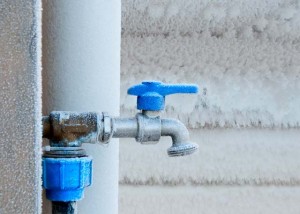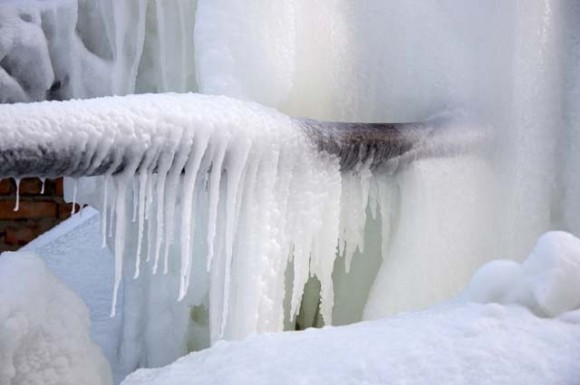During the winter it is common for pipes to freeze if the correct measures aren’t taken.
 This can cause huge problems and if the freezing is severe, can cost you an arm and a leg to fix. Water contains a unique property that causes it to expand as it freezes. This can block up and put pressure on whatever is holding the water, including plastic and pipes. The pressure can be so high at times that it causes pipes to burst, leaving you with a costly problem.
This can cause huge problems and if the freezing is severe, can cost you an arm and a leg to fix. Water contains a unique property that causes it to expand as it freezes. This can block up and put pressure on whatever is holding the water, including plastic and pipes. The pressure can be so high at times that it causes pipes to burst, leaving you with a costly problem.
Pipes that are most likely to burst are those outside such as sprinkler lines and swimming pool lines, pipes present in basements, crawl spaces, garages and attics.
It is important to try and prevent your pipes from freezing if you want to avoid a potentially costly fixtures this is especially important if you are renting off-base.
Ways of preventing your pipes from freezing include:
- Draining any water from lines that supply the likes of swimming pools and sprinklers.
- Never put antifreeze into the lines unless you are told to do so. It can be harmful to the environment and dangerous if it comes into contact with humans and animals.
- Removing your hoses from outside, draining them and making sure that they are stored away for the winter. Any valves inside the home should be closed if they supply outdoor hose bibs and any outside hose bibs should be left open so that water can drain from them. The outside valves should also be left open so that any remaining water inside the valve can expand without damaging the pipe.
- Any pipes in the home that are not properly insulated should be. These include pipes in attics, crawl spaces, basements and garages.
- As well as preventing the pipes from freezing you will also need to take action against cold weather on a daily basis.
This includes:
- Making sure that you close any doors leading to your garage.
- Opening kitchen and bathroom cabinets. This will allow warm air to circulate around the pipes.
- Allowing cold water to drip from the faucet when there are exposed pipes. If you let water trickle through your pipes it will help to prevent them from freezing.
- Although your heating bill will slightly increase you should make sure your thermostat remains at the same temperature day and night. You will find the increased heating bill is far cheaper than replacing burst pipes.
- If your pipes are frozen and have not burst you will need to thaw them so that the situation doesn’t get worse.
There are a number of ways you can do this including:
- Opening the faucet to allow water to run out of it. If you run water through the pipe it will help to melt the ice inside the pipe.
- Heating up areas of the pipe that are frozen. You can do this by applying heat from a hairdryer, electrical heating pads or towels soaked in hot water. It is important to make sure that you do not use an open flame such as a blowtorch.
- If you find that you are unable to find the frozen area or you cannot reach it, call in a professional and make sure to stay in touch with your landlord.
Katy is a keen writer who has a particular interest in home improvement and engineering. She currently writes on behalf of Parkland Engineering, suppliers of food hoses and steam couplings.








